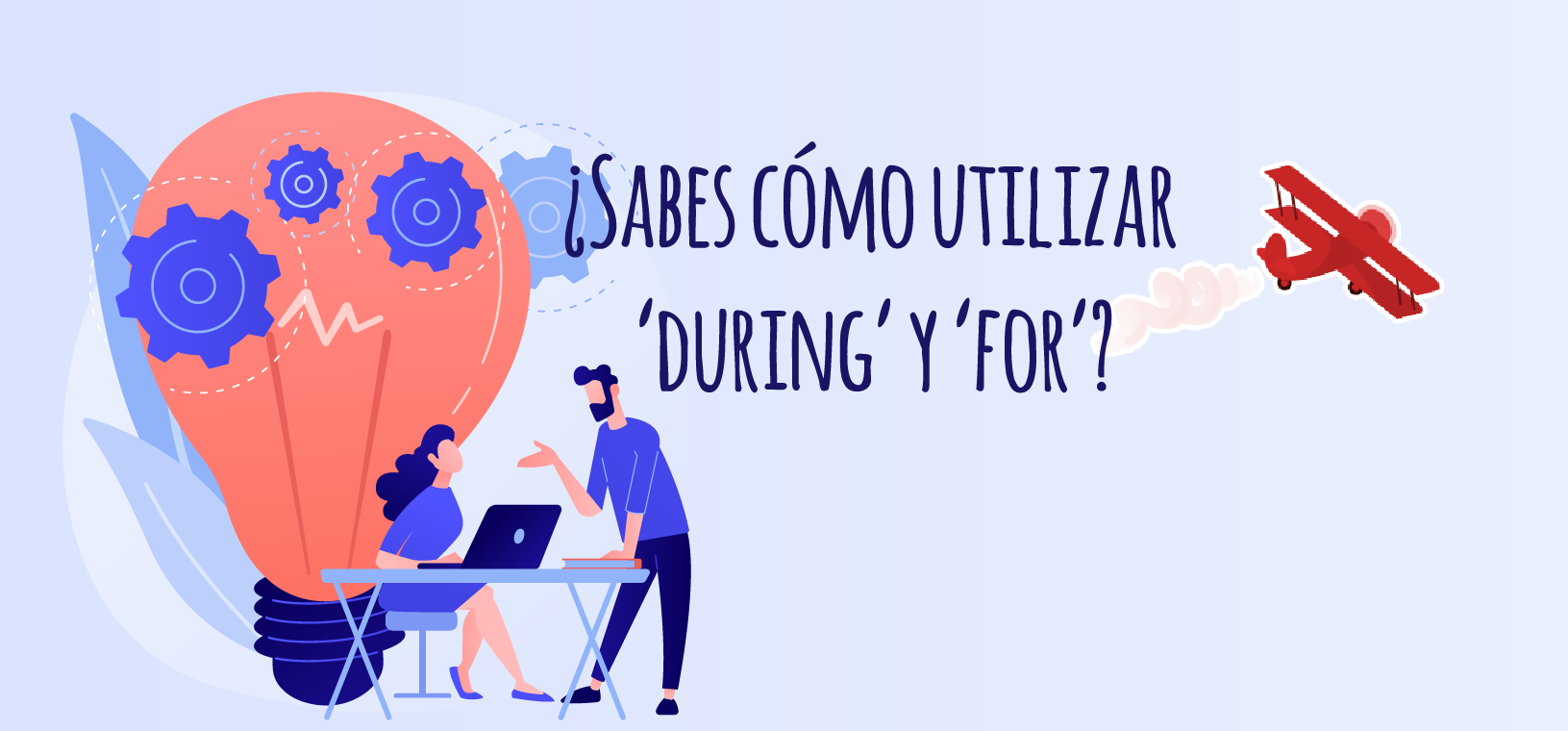Do you know how to use ‘during’ and ‘for’?

In the English language it is possible to express the time and action or a period of time lasts in different ways and due to their similarity they create confusion.
ÍNDICE DE CONTENIDOS
Such is the case of during and for, two prepositions that translate as “during” and yet they are used in different ways. That is why we dedicate this article to teaching how to differentiate them.
How to use “For” and “During” in English
“For” – the amount of time something takes
- I walked the dog for 15 minutes this morning.
Paseé al perro durante 15 minutos esta mañana.
- I traveled to Egypt for 2 weeks.
Viajé por Egipto durante 2 semanas.
“During” – when something happens, a period of time
- You can go apple picking in New England during the fall.
Puede ir a recoger manzanas en Nueva Inglaterra durante el otoño.
- During my vacation, I plan to sleep late and spend time with friends.
Durante mis vacaciones, planeo dormir hasta tarde y pasar tiempo con amigos.
Differences between during and for
The best method we can use to differentiate between during and for is to ask which question they answer. Indeed, while during gives an answer to the question When
- (When) To answer the question How long…?
Spanish students of English often misuse the preposition during, because they confuse it with for, which is sometimes also translated as during. For is used to express how long someone is doing something, and it is also often accompanied by nouns or pronouns.
“During”
Is a preposition that is used before a noun to express the simultaneity of one action with another, but without determining the exact duration of the action. To talk about something that happens at the same time as another. It refers to the fact that the act in question is prolonged in time.
- I will be working during the week.
Estaré trabajando durante la semana.
- Nobody spoke during the meal.
Nadie habló durante la comida.
- During the summer, they went to the beach a lot.
Durante el verano, fueron mucho a la playa.
- I had to get up during the night to go to the toilet.
Tuve que levantarme durante la noche para ir al lavabo.
- She doesn’t go out much during the winter.
Ella no sale mucho durante el invierno.
- He made many mistakes during his life.
Él cometió muchos errores durante su vida.
- Unfortunately, many people got bored during my speech.
Desafortunadamente, mucha gente se aburrió durante mi discurso.
Instead,”for”
It is a preposition that is used before a period of time and, therefore, it does indicate the duration of the action.
- We went to France for three weeks.
Fuimos a Francia durante tres semanas.
- The news surprised him and for a few moments, he didn’t know what to say.
La noticia le sorprendió (a él) y durante unos instantes, no sabía qué decir.
- After the death of her father, she was very sad for a long time.
Después de la muerte de su padre, (ella) estuvo muy triste durante mucho tiempo.
- She was sleeping for some hours.
Ella estuvo durmiendo durante algunas horas.
- They often walk for 30 minutes.
Ellos a menudo pasean durante 30 minutos.
It is used to express a period of time that can be measured even when in Spanish can be omitted, such as hours, weeks, or years. Unlike during, in this case, you specify how long the action lasts.
Therefore, the time period always follows after for ; a week (una semana), four hours (cuatro horas), six years (seis años), etc
For example:
- Llevo muchos años viviendo en España.
- Llevo (he estado) viviendo en España (durante) muchos años.
I’ve been living in Spain for many years.
- Trabajamos juntos diez años.
- Trabajamos juntos (durante) diez años.
We worked together for ten years.
Conclusion
For
It is always followed by a period of time (one day, one week, three hours, five minutes, etc.). We use for when we want to express the time during which something happens. For example She was in Paris for eight days.
During
It is always followed by a noun (a break, your vacation, the night, a soccer game, etc.). We use during when we express that something happens at the same time as something else. For example, we prayed during the mass.
Joint use of during and for
When we make up a sentence that contains the two prepositions (During and For), it is perfectly verified in which situation each one should be used.
In the use of a joint phrase, where both prepositions are used, you will see even better in which case each is used.
- During the winter I like to walk with my wife and children, but it sometimes rains.
Durante el invierno me gusta pasear con mi mujer y mis hijos, pero nos llueve a veces
Indeed, as shown, if you ever have any doubt as to whether you should use it during or for, the practical thing is to ask yourself if it responds to When or How long. You are sure to find the right answer.


